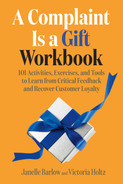CHAPTER 4
The Treasure of Complaints as Gifts

The true treasure of complaints is that if handled well, customers often feel more positively toward an organization than if they didn’t encounter a problem in the first place. We also learn from our customers when they complain.
If these are the outcomes resulting from complaints, why wouldn’t we look for more customer feedback or complaints? Yet many companies seek to eliminate this treasure trove.
In this chapter, we will look at five reasons why complaints are gifts.
ACTIVITY
19
How Your Emotions Affect Your Complaint Handling
We say complaints are gifts, but are they?
LTIO: Circle the negative emotions that come to mind when you hear “I have a complaint.”
Ambivalence | Disbelief | Guilt | Insecurity |
Anger | Discomfort | Hatred | Panic |
Animosity | Disgust | Helplessness | Rage |
Annoyance | Dislike | Hostility | Resentment |
Defensiveness | Distrust | Inadequacy | Sadness |
Choose two of these emotions, and write how holding these negative emotions could impact your complaint handling.
Negative emotion: ________________________________________________
Impact: _________________________________________________________
Negative emotion: ________________________________________________
Impact: _________________________________________________________
What would be your reaction if we listed positive feelings instead of negative emotions? Circle all the positive emotions you think of when you hear “I have a complaint.”
Amusement | Care | Happiness | Lightheartedness |
Anticipation | Curiosity | High energy | Motivation |
Appreciation | Excitement | Hope | Pride |
Awe | Generosity | Inspiration | Selflessness |
Calm | Gratitude | Interest | Surprise |
Now choose two of these emotions, and write how if you held these positive emotions they would impact your complaint handling.
Positive emotion: _________________________________________________
Impact: _________________________________________________________
Positive emotion:_________________________________________________
Impact: _________________________________________________________
LEARNING POINT: Our emotional state will impact how we react to complaints, so fostering positive emotions is a good idea.
Finding the positive is not always easy. Sometimes complaints are gifts that come wrapped in ugly paper with thorns and needles attached. But the important thing is to look beyond the outer appearance and find the learning that will help us improve.
Notes:

ACTIVITY
20
Five Reasons Why Complaints Are Gifts
When we first began to explore the A Complaint Is a Gift concept, we primarily focused on two advantages of this philosophy. First, complaints are the biggest bargain in market research. Complaints tell us what our customers like and don’t like. The second advantage involves customer loyalty—if you handle customers’ complaints well, they tend to stick with you.
Then about ten years later, we added to the list of advantages and are now at five reasons why complaints are gifts. Complaints are gifts because they
• Define what customers want
• Help identify the most loyal customers
• Are the least expensive marketing tool around
• Mean that customers are still talking with us and not anyone else
• Help retain customers if their complaints are handled well
LTIO: Think about these reasons. Could they change your approach to complaints if you think they are advantageous?

Come back to each of these reasons as you progress through this chapter. They are essential in your mindset development to see complaints as gifts.
For instance, imagine that a complaining customer is standing in front of you, and these five advantages pass through your mind. They can help you avoid assuming that a grouchy customer doesn’t appreciate what you do to solve their problems. What would be your attitude instead? How would your attitude about your customer change?
Notes:

ACTIVITY
21
Complaints Define What Customers Want
Have you ever had a good idea for a business when you were a customer? Maybe you said, “Hey, why don’t you . . .”
Here’s an example. Janelle bought an expensive coffee maker that she loves. Unfortunately, after a couple of months, the glass carafe that collects the brewed coffee broke. The glass was fragile, and it shattered while she was cleaning it.
Because the carafe is probably the least expensive part of the coffee maker, Janelle thought she could easily replace it on Amazon.
Not possible. Of course, the manufacturer makes the carafes, or they wouldn’t have them to provide with the coffee maker! But neither Amazon nor the manufacturer sells replacement carafes.
Then Janelle noticed that she wasn’t the only one with the same problem. Dozens of people had the same issue. They didn’t blame the manufacturer or Amazon. They just wanted to buy a replacement for the shattered carafes.
LTIO: Imagine you are the CSR who handles complaints about the carafes. A customer calls with the same problem Janelle experienced. Everyone in your company knows about this recurring problem, including you. After all, it’s in all the comments online. Everyone is rating your coffee maker very low as a result of no carafe replacements. What do you say to these customers? You don’t know for sure that your company will start to sell the carafes as replacement items, but it’s what customers want. Write your ideas on the lines below.

Tell a partner what you would say and ask if your response would satisfy them. If they don’t like what you said, ask what it would take to make them happy. Write their comments here.

Based on your partners’ comments, what would you say to customers who call? Write it here and check back with your partner to see if your adjustment would work for them.

When you learn about a similar product or service issue from your customers, consider who you should tell inside your company.
ACTIVITY
22
Complaints Tell Us Who Is Loyal
Forbes Councils is an invitation-only organization that gains solid advice from its business members. Here’s such an example from one of its members: “I find that it is often a business’s most loyal customers who are more likely to complain in the first place. These individuals are already displaying a certain level of brand affinity to care enough to actually take the time to get in touch.”1
Does this match you? When you complain, are you a more loyal customer?
LTIO: Think of an example when you intensely disliked a service or product. You feel you got a rotten deal the first time you bought something from a company. After the second time you purchased from it and are again disappointed, you are never going back.
How likely are you to complain? Circle a number.

Let’s change the scenario a little. You shop at a company you have been going to for at least a few years. You like the people who work there, and you like the brand and its products and services. But you had a problem the last time you shopped there.
Are you likely to go to the trouble to complain? Circle a number.

What would you expect from this company or brand?

When a complaining customer approaches you, do you think it would be a good idea to assume that this person is likely a loyal customer? Imagine a sticky note on their forehead with a number indicating the years they’ve been loyal or how much money they have spent with you. This figure can indicate how valuable this customer is to you.
Notes:

ACTIVITY
23
Complaints Are an Inexpensive Marketing Tool
Companies spend an enormous part of their budgets learning about their customers and marketing to them. They use various tools, including focus groups, reviews of consumer expectations in parallel industries, transaction-based studies, and mystery shoppers. If you’re not in marketing or you don’t recognize these terms, don’t worry.
The important thing for you to know is that your complaint handling is much more dynamic and happens in real time. Large companies use tools like those listed above, which are necessary. But small and medium-sized companies must rely on customers to tell them directly what they think. None of the tools listed above bring customers closer to you than complaint handling. Customers will likely have something specific to say if they are asked while complaining. These gifts are useful because they occur in real-life situations.
There is an old example that makes this point. In the mid-1980s, Coca-Cola conducted research on its New Coke concept. But people blasted Coke with complaints on its eight hundred phone lines when the new product was released in place of the now Coke Classic. They protested at Coke’s Atlanta headquarters and threatened never to buy Coke again. Even though the new concept had passed with flying colors in survey and tasting research, customers felt betrayed. Without question, marketing research is valuable, but nothing compares to having your fingers on the pulse of customer preferences.
LTIO: Ask someone in your marketing department if they ever listen to customer complaints. Why or why not? If they say they listen closely in focus groups, that’s not the same. How do they see complaint handling as part of their toolbox?

Notes:

ACTIVITY
24
Complainers Are Still Talking with You
Have you ever been in a conflict where you or another person were so upset with each other that you stopped talking for a while? It could have been over something like forgetting to stop by the grocery store on the way home from work to pick up a container of milk or forgetting that yesterday was your birthday.
What happened next?
We’ve talked with people who won’t say another word to someone they’ve been close to—sometimes not speaking for years. If no talking occurs for a lengthy time, it probably means the relationship is over. If this happens between family members, family gatherings can get awkward when adult siblings or parents and children don’t talk with each other.
How about the opposite? You and a family member rarely talk with each other without getting snippy or irritated. Which situation is better: not talking or getting annoyed while talking? The choice is up to you, of course.
Eventually, people have to communicate with each other, or whatever relationship they have will end, so maybe some talking is good. Let’s apply this principle to customers.
If our customers stop talking with us, what’s going to happen to that relationship? If customers don’t tell you what’s bothering them, they are probably telling others. If that’s the case, do you think they are saying nice things about you? Likely not. Who would you prefer they talk to about their complaints, you or the marketplace?
The choice is up to us. Be open to listening. Keep asking for customer feedback, even if the customer is sarcastic and hostile.
LEARNING POINT: If a customer is upset with you while complaining, at least they are still talking with you. Celebrate that!
Notes:

ACTIVITY
25
Complaints Are an Opportunity to Keep Your Customers
What are your customer-retention numbers? Ask someone in marketing or customer service to help you answer the questions below.
How many customers does your company lose every year because of poor service or product quality? What does that mean in terms of revenue lost every year? An estimate will do. How many new customers does your business (or department) have to get each year just to replace the ones the business loses?
These numbers are important and can represent a significant amount of money lost to businesses each year.
Have you ever had a negative service or product experience that you now remember as positive? Researchers have found that close to 25 percent of customers surveyed stated that all positive memories of incidents from airline, hotel, and restaurant industries started as service delivery failures. Yet they remained loyal customers.2 The numbers might differ for companies that sell high-ticket items, but this research still makes a compelling point.
LTIO: Think of an example of a personal negative event that ended up being positive for you. What happened? What do you think about it now? What did the complaint handler do to turn your assessment of the incident into something positive?
ACTIVITY
26
How to Get More Complaints
We’ve listed five reasons why complaints are gifts. Perhaps we should get more complaints. We think that’s a good idea.
You should encourage more customers to speak up and tell you how to do something better. Even if you don’t implement all their suggestions, these customers are engaged, feel connected to you, and are signaling they would like your company to get better.
LTIO: How can you get more complaints? Share your ideas below.

Ask your customers directly under which circumstances they would comfortably give you more feedback. You can tell them you are doing this for a workshop you are taking. They’ll probably help!

Here are four more ideas we think will work to get additional customer feedback.
1. Use every opportunity to ask your customers what they think (e.g., about your products, service, pricing). By requesting that customers provide their opinions, you create a psychological contract with them that says, “I value you, and I want to know as much as I can how to help you.” It’s like shaking someone’s hand on an agreement.
2. We’ll say this several times in this workbook: show your customers you take their opinions seriously by writing their comments down. Serious listening sends the message that you value them—especially if you ask how they think you can improve.
3. After a customer shares feedback, be sure to ask, “Is there anything more?” which shows you’re not afraid of their feedback or complaints.
4. If you get a good idea you can use, be sure to tell them how much you appreciate their input. Of course, you can’t just say those words. You’ve got to believe it.
LTIO: The next time you talk with a customer, try one—or all four—of these ideas and see if they grace you with an additional gift! What happened with each of these ideas?
Idea 1. __________________________________________________________
Idea 2. __________________________________________________________
Idea 3. __________________________________________________________
Idea 4. __________________________________________________________
Notes:

ACTIVITY
27
When Organizations Stop Getting Complaints
The bankruptcy of major companies is painful for large numbers of staff, customers, and shareholders. The loss of Pan American Airways was a business tragedy. It called itself the “World’s Most Experienced Airline,” while other people called it the “World’s Most Arrogant Airline.”
The airline existed for sixty-four years and was once the world’s largest international carrier. It was a jewel among airlines. It set world records and launched the Boeing 747 airplane, which was primarily used for international travel as the aircraft never worked for Pan Am in the US domestic market. High fuel costs that had not been adequately anticipated and managed was a big part of its problem. In January 1991, Pan Am was sold to United Airlines in bankruptcy proceedings.
The Pan Am brand was so strong that it still lives on. Other airlines have attempted to use the name and soar in the skies once again. None succeeded. Nonetheless, the name is a legacy and one of the most prominently branded names in aviation history.
At the company’s end, regular mishaps were experienced, and it lost $5 million per day. Passengers were fed up with Pan Am’s inability to fix customer issues, so people stopped flying with the airline.
In a letter to a major newspaper editor right before Pan Am was sold to United Airlines, a staff member wrote that service had gotten so bad that customers stopped complaining. They knew it wouldn’t do any good. The letter talked about a chartered Pan Am 747 jet filled with a group going on a weeklong all-inclusive vacation. The plane arrived at the resort a day late with none of the passengers’ luggage.
According to the frustrated employee, not a single passenger complained.
Janelle flew Pan Am internationally in its last year of operation. Her experience was that it did not live up to its reputation either. Lack of motivation to serve customers was noticeable. Though it was once considered prestigious to fly Pan Am, the flight didn’t match the hype. Both passengers and crew were unmotivated.
LEARNING POINT: Even a great reputation won’t help if service or products aren’t delivered. If no improvements are made to keep once-loyal customers, they will give up and stop complaining regardless of how well-known the business is.
LTIO: Think of any current well-branded business that you suspect may not last for the long haul. What have you noticed happening that makes you think that way? It tells us how important complaint handling is.

Notes:


SELF-CHECK: The Treasure of Complaints as Gifts
Which do you think is the most important of the five reasons why complaints are gifts? Why is it the most important reason for your company?

What questions should you ask to learn more about what your customers want when you hear them talking about something that dissatisfied them?

What questions should you ask of long-term complaining customers to learn why they want to leave your company, or what it would take to get them to stay?

What should you say to customers who indicate they are thinking about not returning? What types of statements will perhaps encourage them to give your organization another chance?

